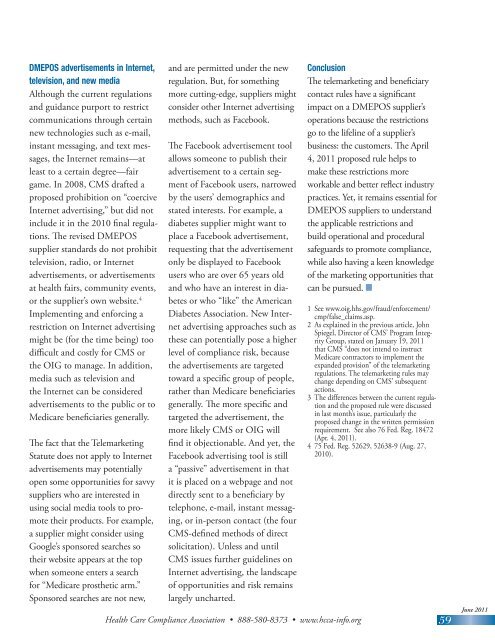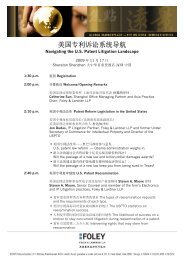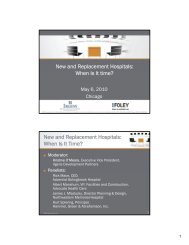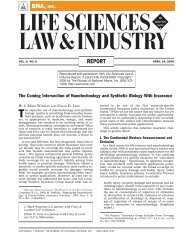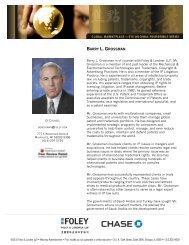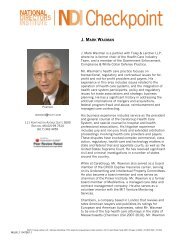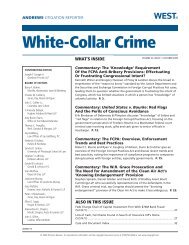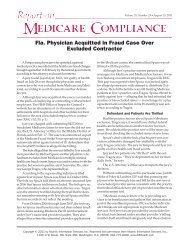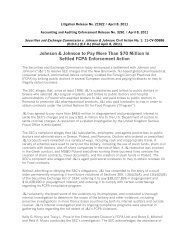Compliant DMEPOS Telemarketing - Foley & Lardner LLP
Compliant DMEPOS Telemarketing - Foley & Lardner LLP
Compliant DMEPOS Telemarketing - Foley & Lardner LLP
Create successful ePaper yourself
Turn your PDF publications into a flip-book with our unique Google optimized e-Paper software.
<strong>DMEPOS</strong> advertisements in Internet,<br />
television, and new media<br />
Although the current regulations<br />
and guidance purport to restrict<br />
communications through certain<br />
new technologies such as e-mail,<br />
instant messaging, and text messages,<br />
the Internet remains—at<br />
least to a certain degree—fair<br />
game. In 2008, CMS drafted a<br />
proposed prohibition on “coercive<br />
Internet advertising,” but did not<br />
include it in the 2010 final regulations.<br />
The revised <strong>DMEPOS</strong><br />
supplier standards do not prohibit<br />
television, radio, or Internet<br />
advertisements, or advertisements<br />
at health fairs, community events,<br />
or the supplier’s own website. 4<br />
Implementing and enforcing a<br />
restriction on Internet advertising<br />
might be (for the time being) too<br />
difficult and costly for CMS or<br />
the OIG to manage. In addition,<br />
media such as television and<br />
the Internet can be considered<br />
advertisements to the public or to<br />
Medicare beneficiaries generally.<br />
The fact that the <strong>Telemarketing</strong><br />
Statute does not apply to Internet<br />
advertisements may potentially<br />
open some opportunities for savvy<br />
suppliers who are interested in<br />
using social media tools to promote<br />
their products. For example,<br />
a supplier might consider using<br />
Google’s sponsored searches so<br />
their website appears at the top<br />
when someone enters a search<br />
for “Medicare prosthetic arm.”<br />
Sponsored searches are not new,<br />
and are permitted under the new<br />
regulation. But, for something<br />
more cutting-edge, suppliers might<br />
consider other Internet advertising<br />
methods, such as Facebook.<br />
The Facebook advertisement tool<br />
allows someone to publish their<br />
advertisement to a certain segment<br />
of Facebook users, narrowed<br />
by the users’ demographics and<br />
stated interests. For example, a<br />
diabetes supplier might want to<br />
place a Facebook advertisement,<br />
requesting that the advertisement<br />
only be displayed to Facebook<br />
users who are over 65 years old<br />
and who have an interest in diabetes<br />
or who “like” the American<br />
Diabetes Association. New Internet<br />
advertising approaches such as<br />
these can potentially pose a higher<br />
level of compliance risk, because<br />
the advertisements are targeted<br />
toward a specific group of people,<br />
rather than Medicare beneficiaries<br />
generally. The more specific and<br />
targeted the advertisement, the<br />
more likely CMS or OIG will<br />
find it objectionable. And yet, the<br />
Facebook advertising tool is still<br />
a “passive” advertisement in that<br />
it is placed on a webpage and not<br />
directly sent to a beneficiary by<br />
telephone, e-mail, instant messaging,<br />
or in-person contact (the four<br />
CMS-defined methods of direct<br />
solicitation). Unless and until<br />
CMS issues further guidelines on<br />
Internet advertising, the landscape<br />
of opportunities and risk remains<br />
largely uncharted.<br />
Health Care Compliance Association • 888-580-8373 • www.hcca-info.org<br />
Conclusion<br />
The telemarketing and beneficiary<br />
contact rules have a significant<br />
impact on a <strong>DMEPOS</strong> supplier’s<br />
operations because the restrictions<br />
go to the lifeline of a supplier’s<br />
business: the customers. The April<br />
4, 2011 proposed rule helps to<br />
make these restrictions more<br />
workable and better reflect industry<br />
practices. Yet, it remains essential for<br />
<strong>DMEPOS</strong> suppliers to understand<br />
the applicable restrictions and<br />
build operational and procedural<br />
safeguards to promote compliance,<br />
while also having a keen knowledge<br />
of the marketing opportunities that<br />
can be pursued. n<br />
1 See www.oig.hhs.gov/fraud/enforcement/<br />
cmp/false_claims.asp.<br />
2 As explained in the previous article, John<br />
Spiegel, Director of CMS’ Program Integrity<br />
Group, stated on January 19, 2011<br />
that CMS “does not intend to instruct<br />
Medicare contractors to implement the<br />
expanded provision” of the telemarketing<br />
regulations. The telemarketing rules may<br />
change depending on CMS’ subsequent<br />
actions.<br />
3 The differences between the current regulation<br />
and the proposed rule were discussed<br />
in last month’s issue, particularly the<br />
proposed change in the written permission<br />
requirement. See also 76 Fed. Reg. 18472<br />
(Apr. 4, 2011).<br />
4 75 Fed. Reg. 52629, 52638-9 (Aug. 27,<br />
2010).<br />
59<br />
June 2011


